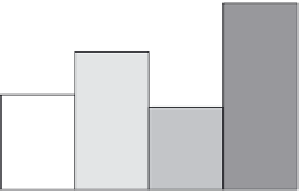Agriculture Reference
In-Depth Information
35
CTRL
N3
HP
HPN3
b
30
b
25
a
a
20
15
10
IgG
Figure 16.2. Colostral IgG concentrations of first-parity sows fed n-3 fatty acids (N3) or high-protein (HP) diets,
individually or in combination (HPN3), during late gestation and throughout lactation (
a,b
differ, P<0.01).
Adapted from Mateo
et al
. (2009).
16.3.4
Effects of omega fatty acids on sow and piglet performance
In swine, maternal dietary supplementation with oil during gestation was shown to have
an impact on foetal growth and development (Corson
et al.
, 2008; Laws
et al.
, 2009b).
There are indications that dietary supplementation with n-3 FA could have positive
effects on piglet vitality and pre- and post-weaning growth whereas no clear effects on
sow reproductive performance were reported (Tanghe and De Smet, 2013). Dietary
supplementation of long chain n-3 FA, including EPA and DHA, affects numerous
molecular and cellular pathways through transcriptional regulation of a plethora of genes,
and this is proposed as a mechanism through which PUFA can influence reproduction
(Waters
et al.
, 2014). Supplementing corn-soybean diets fed to breeding gilts and sows
with fish oil led to significant improvements in litter size at birth (Smits
et al.
, 2011;
Spencer
et al.
, 2004; Webel
et al.
, 2004). Supplementation of the sow' s diet with 1.75%
tuna oil during gestation was also reported to improve piglet growth, and feeding tuna oil
at different times during gestation had different effects on the brain FA status of piglets
(Rooke
et al.
, 2001a). Mateo
et al.
(2009) reported that provision of 0.2% n-3 FA in the
lactation diet using fish oil alone improved the growth of nursing piglets regardless of
parity. In addition, Laws
et al.
(2007a) reported that sows fed 10% fish oil during the first
60 d of gestation showed an improved neonatal outcome and the subsequent growth
performance of their offspring during the pre-weaning period, while supplementation of
fish oil from d 60 of gestation until parturition had no effect on piglet weight at birth and
weaning (Laws
et al.
, 2007b). Maternal dietary supplementation with 100 g/d of fish oil
from 109 d of gestation until weaning (24 d) was also shown to improve small-intestinal
morphology and growth performance in post-weaning piglets (Leonard
et al.
, 2010a,
2011). However, there are also numerous published studies that report no significant
response to supplementation in sows from early or from mid- or late-gestation (Estienne
et al.
, 2006; Lauridsen and Danielsen,2004; Perez-Rigau
et al.
, 1995; Rooke
et al.
, 1998,
1999, 2001a,b). Rooke
et al.
(2001c) observed a reduced pre-weaning mortality in piglets
from sows fed 1.65% salmon oil throughout gestation and lactation, and this was largely










